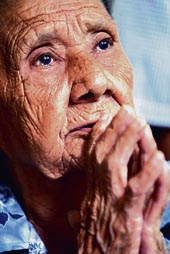 |
| Pals and prayer |
London, June 15 (Reuters): Having a network of good friends is more important than close family contacts for helping the elderly live longer, scientists said.
In a 10-year study of nearly 1,500 people over 70, researchers at Flinders University in Adelaide, Australia found that those with the most friends tended to lived longer.
“Survival time may be enhanced by strong social networks,” said Lynne Giles, of the university's department of rehabilitation and aged care, in a report in the Journal of Epidemiology and Community Health.
“Among older Australians, these may be important in lengthening survival,” she added.
Contact with children and other family members had little impact on the 10-year survival, she said.
Giles and her colleagues assessed how economic, social and behavioural and environmental factors affected the health of elderly people.
The researchers monitored the participants annually for the first four years of the study and then at three year intervals.
They also considered the impact of other factors such as health, lifestyle and socioeconomic status.
“We have shown that greater social networks with friends and confidants had significant protective effects against mortality over a 10-year follow-up period,” said Giles.
The scientists suspect that friends help to increase longevity by influencing behaviour such as smoking and drinking and helping people cope during difficult times.
In a commentary, Anthony Jorm of the Australian National University in Canberra said the study supports the need for a clinical trial to see whether social networks have a health benefit for the elderly.
“These findings suggest what sort of interventions might be useful in improving the health of older people,” he added.










